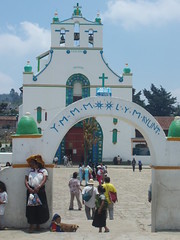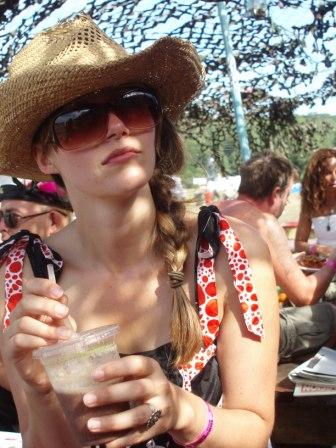Chamula

It can be tough being a woman if you come from San Juan de Chamula. So said our guide during our tour of the village, one of the most distinctive indigenous villages outside San Cristobal de las Casas in Chiapas.
When you´re very young you get taught the basic womanly tasks you´ll need to be a good daughter and a good wife, like how to make tortillas, how to make your highly distinctive costume, how to make copies of your highly distinctive costume to sell to the tourists that come to Chamula to look at you. You wear this costume as soon as you can walk, the black woollen skirt as thick and rough as a sheep´s hide, and the shiny, embroidered blouse that all the foreign ladies covet. You also learn how to weave brightly coloured ribbons in your hair. Your brothers might be tearing around the village in jeans, t-shirts, like their fathers, but women keep to the traditions of dress, and some make their livelihoods out of this.
When you reach puberty, your parents might start to barter with other parents for a good marriage. A man in the village might like you, but instead of approaching you and courting you, instead of allowing for the tedious business of love, his parents make an offer. If it´s good, you are sold. There is no marriage in Chamula, even though devotion to traditional catholicism as it is called is a pre-requisite for living here. Traditional catholicism in these parts is unlike the incense and hail mary stuff in the rest of the Catholic world. The great church in town rarely sees ceremony other than baptism, there are no priests, no pews, no sacred spaces off limts to worshippers. People come at all times of the day to clear a space amongst the pine needles that cover the floor, and light candles to heal their sick. The church is a hospital and people will come here before they consult doctors. They consult healers instead who pray with them, and who use chickens or eggs to cure their clients. Every worshipper has a bottle of something fizzy with them, often Coca Cola. Burping is pretty holy here, and you can burp out your sins much more effectively with Coke than with the blue corn water people used to use. Those that embrace new religions, or no religion, are thrown out of the village. The women that wear woollen shirts in San Cristobal have most likely been expelled from Chamula as followers of evangelical protestanism - not protestantism as such, just not Chamula´s way of doing things.
It´s important to marry early and provide children. As you reach your late twenties you are considered old, too old for family life. It´s also presumably politic for you to keep tabs on your man, to make sure he´s not lacking much. Polygamy is rife in the village, according to our guide, who does not come from Chamula. It was positively encouraged by the Spanish when they arrived those few centuries ago. Faced with a small, weak population, and thus a potentially weak position politically in Chiapas, they brought women from the capital and from Oaxaca to marry with themselves, and what was left of the local men who hadn´t succumbed to the diseases the Spanish brought with them. If a man wanted more than one wife, then so be it; all the better to repopulate the region. These customs have since fallen out of favour in the region, everywhere but in Chamula. Our guide was adamant the other villages were open-minded. In Chamula people are closed, he said. It is an oasis of convoluted religious practices, social protocols and entirely a law unto itself. The police, the militia, so evident Chiapas have no presence here. The village authorities only just about tolerate outsiders, particularly tourists. Presumably it is too lucrative not to bear them for a while. All tourists must leave the village at six, though. They can´t stay the night here.
If your husband does take an interest in another woman, you might be forced to leave with your children and fend for yourself. This you do by relying on those skills that mothers pass preciously on to their daughters. Cooking, embroidery, making tourist tat to sell in San Cristobal. Your children pound the pavement all day and long into the evening, selling woven belts, zapatista dolls, bags and blouses and sometimes chewing gum and corn on the cob. Industry starts young. Back in the village the men do their thing in their jeans and cowboy hats.
To prove that Chamula is not like any other village, we were taken to Zincantan, a few kms away. Here, a local family showed us round their home, made us some tortillas whilst our guide plied us with the local moonshine. Thus emollified, we were then invited to shop in their back yard and take pictures of the cute children for a few pesos. It was hard to resist - a touch of the Angelina Jolie´s again - and this is one of the results:



<< Home